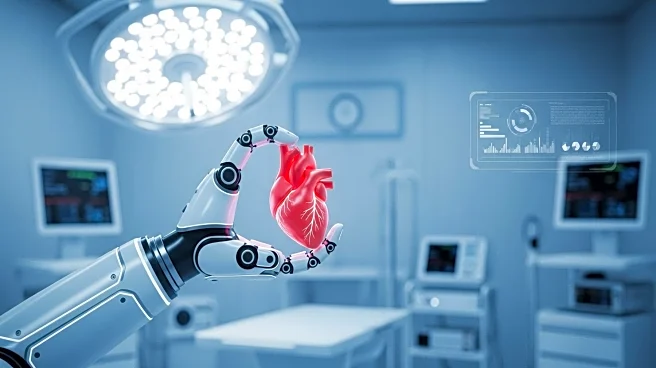What is the story about?
What's Happening?
The healthcare industry is increasingly turning to robotics to address workforce shortages and budget constraints. According to a report, hospitals are under pressure to optimize resources, with a predicted global shortage of 10 million healthcare workers by 2030. In the U.S., a shortfall of up to 86,000 physicians is expected by 2036. Robotics, both in surgical and logistical applications, is seen as a solution to these challenges. Companies like OTSAW and SS Innovations are deploying robots to perform repetitive tasks and assist in surgeries, respectively. The adoption of surgical robotics is growing, with companies like Intuitive Surgical leading the market, while new entrants are driving down costs. The COVID-19 pandemic accelerated the integration of logistics robots in hospitals, a trend that continues as healthcare facilities seek to improve efficiency and reduce staff exposure to risks.
Why It's Important?
The integration of robotics in healthcare is significant as it addresses critical issues such as workforce shortages and financial constraints, particularly in rural hospitals affected by federal budget cuts. By automating routine tasks, hospitals can reallocate human resources to more patient-centric roles, potentially improving care quality. The reduction in costs for surgical robotics could democratize access to advanced medical procedures, benefiting patients who previously lacked access to specialized care. This shift also highlights the potential for robotics to transform healthcare delivery, making it more efficient and accessible, which is crucial in a sector facing increasing demand and limited resources.
What's Next?
As robotics technology continues to evolve, further integration into healthcare systems is expected. Hospitals may increasingly adopt leasing models for robotics to minimize upfront costs, while ongoing advancements in artificial intelligence and machine learning could enhance the capabilities of these systems. The industry may also see a push for educational programs to train engineers and healthcare professionals in robotics, addressing the talent gap and ensuring the sustainable growth of this technology in healthcare. Stakeholders, including policymakers and healthcare providers, will need to navigate the ethical and operational implications of increased automation in patient care.
Beyond the Headlines
The rise of robotics in healthcare raises ethical considerations about the role of human workers and the potential for job displacement. However, proponents argue that robots can complement human efforts, allowing healthcare professionals to focus on tasks that require empathy and complex decision-making. The cultural shift towards accepting robots in healthcare settings may also influence public perceptions of technology in everyday life, potentially leading to broader acceptance of automation in other sectors.















